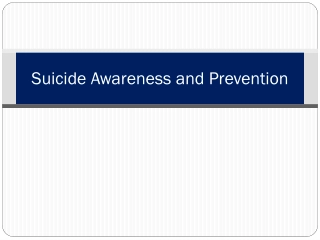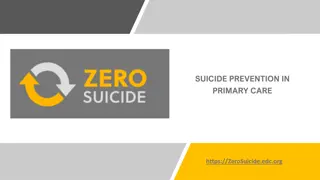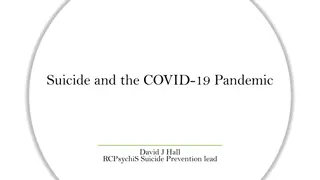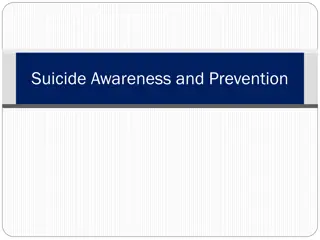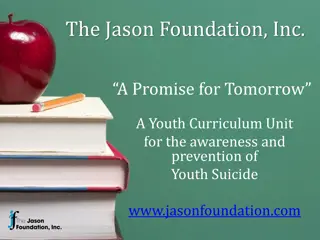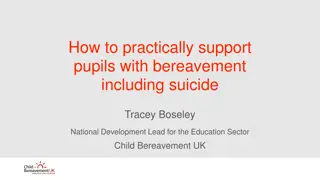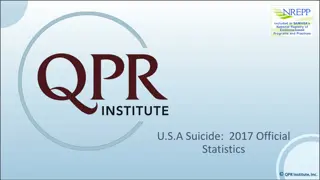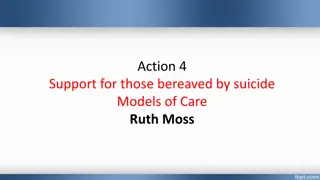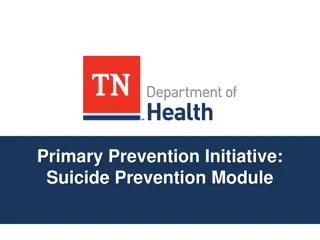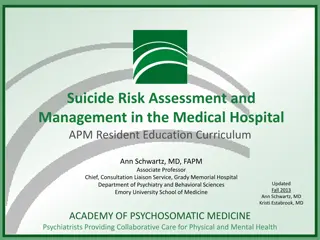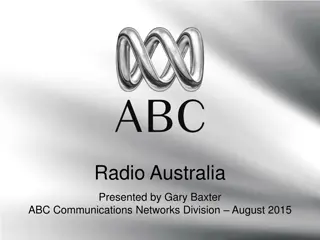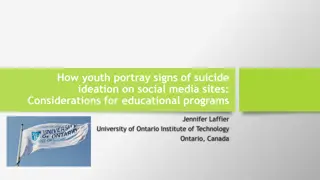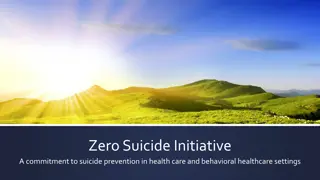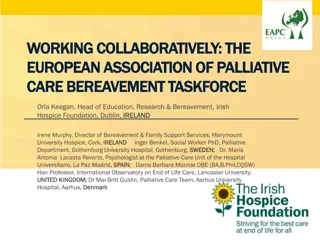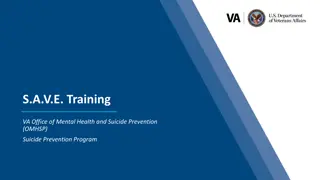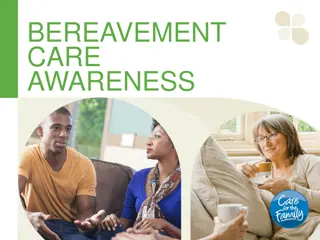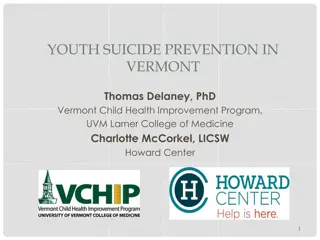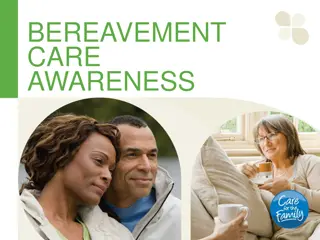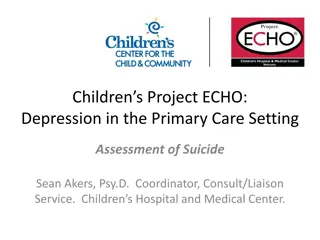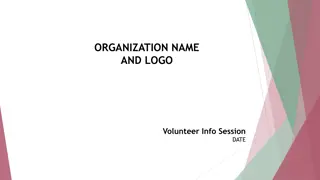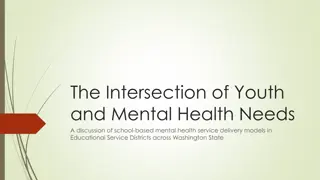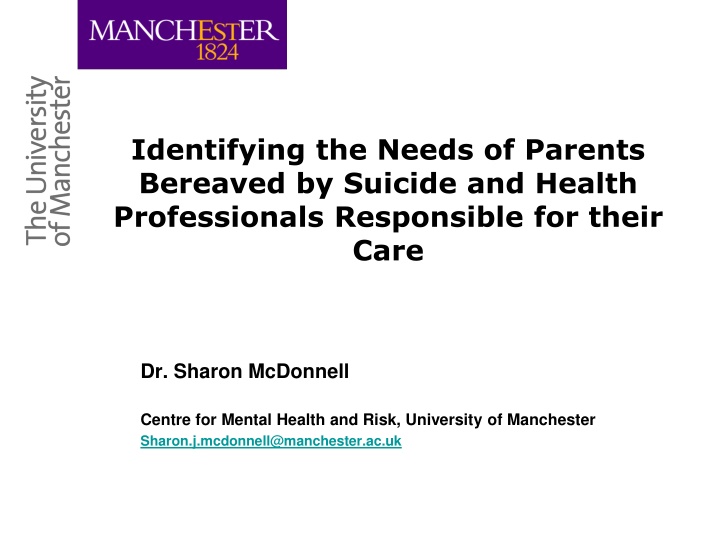
Supporting Parents Bereaved by Suicide: Insights and Progress
Gain insights into the experiences and needs of parents bereaved by suicide and the professionals caring for them. Learn about UK's advancements in supporting those affected by suicide and the development of a suicide bereavement research unit at the University of Manchester.
Download Presentation

Please find below an Image/Link to download the presentation.
The content on the website is provided AS IS for your information and personal use only. It may not be sold, licensed, or shared on other websites without obtaining consent from the author. If you encounter any issues during the download, it is possible that the publisher has removed the file from their server.
You are allowed to download the files provided on this website for personal or commercial use, subject to the condition that they are used lawfully. All files are the property of their respective owners.
The content on the website is provided AS IS for your information and personal use only. It may not be sold, licensed, or shared on other websites without obtaining consent from the author.
E N D
Presentation Transcript
Identifying the Needs of Parents Bereaved by Suicide and Health Professionals Responsible for their Care Dr. Sharon McDonnell Centre for Mental Health and Risk, University of Manchester Sharon.j.mcdonnell@manchester.ac.uk
Centre for Mental Health and Risk Suicide Prevention Suicide Self harm Suicide bereavement
Aim of the Presentation Describe the experiences and perceived needs of parents bereaved by suicide and health professionals responsible for their care; Highlight the progress that has been made in the UK to support those bereaved or affected by suicide; and Share the University of Manchester vision to develop the first suicide bereavement research unit in the UK.
Suicide Prevention Research has three aspects: Prevention Intervention Postvention (care of those bereaved by suicide)
Qualitative Research Methods Often used in psychological and health-related research for the following reasons: to explore relatively complex and sensitive issues; as a starting point to explore new areas of research; and to develop a deeper understanding of a specific phenomenon.
Suicide Bereavement Suicide bereavement is a risk factor for suicide. Little is known about the experiences of those bereaved by suicide. No specialist services within the NHS. Health professionals uncertain how to respond.. Those bereaved feel isolated and helpless.
Suicide Tip of the iceberg: The small perceptible part of a much larger problem that remains hidden. What lies beneath?
Statistics 6045 died by suicide in UK in 2011. Estimated 7-10 people are profoundly affected by each suicide. (Lukas and Seiden, 1987) Translates to 42,000 to 60,400 bereaved by suicide in the UK annually. Suicide rates are between 80% - 300% higher than the general population. (Lukas and Seiden,1987)
Parents Bereaved by Suicide High suicide rate amongst young men. Some parents can feel suicidal and find it difficult caring for surviving children who are also finding it difficult to cope. PhD focussed on experiences of parents bereaved by suicide.
Method Qualitative approach o Interpretative phenomenological analysis (Smith, 1999) o In-depth semi-structured interviews. Parents were: o 19 bereaved parents (11 mothers, 8 fathers). o Aged between 40 and 67 years. o Bereaved between 1-2 years. Deceased were: o All males (n=12) aged between 19-32 years. o suicide (n=8) or open verdict (n=4). o Death occurred in Greater Manchester (Oct 1997- Sept 1999).
Aim of the Study Investigate the experiences of parents bereaved by suicide o Experiences of contact with professionals; o Perceived needs; and o Responses to the death.
Professionals are often uncertain how to respond to those bereaved by suicide. GPs (Halligan, 2000) Psychiatrists (Brownstein, 1992) Intensive care staff (O Dell, 1997)
Disillusionment with Services Often began whilst caring for their suicidal child. Intensified with subsequent contact both prior and after their child s death.
Findings: Parents perceptions Being informed of their child s death Professionals avoiding contact Inappropriate responses to the suicide Failure to refer suicidal parents to specialist services.
Breaking bad news All parents were able to recollect graphically their experiences of being informed of their child s death. o Traumatised o Angry o Lasting distress (2 years post loss)
Breaking Bad News: Transport Police Father found son s suicide note and phoned the police. They said Well where do you think he s gone? And I said, I think he s gone on the railway, put himself under the train (distressed). And they said, Well that s exactly what he s done. (crying)
Avoiding contact: GPs None of the participants were visited by their GP after the death. Every participant in the study would have liked their GP to have visited them.
Avoiding contact: GPs R: Have you ever felt a professional has treated your loss in an insensitive way? Well .to say nothing at all [GPs] is the most insensitive of all.
Avoiding contact: GPs GPs at place of death He pronounced him dead and went. And I never heard another word from him, not How are you? , not, Are you suffering? Do you want any help? ..nothing.
GPs inappropriate responses to the suicide Father He (GP) just said it s (suicide) on the increase in the North west. Mother His first words, (GP) Well you know schizophrenics tend to do that.
GPs failure to refer suicidal parents to specialist services Mother bereaved 20 months R : You said before that you ve felt like you wanted to end your life? Yeah, I told him [GP] that and I said, I really need somebody to talk to. He said, Well have you got a friend? I said, I haven t [..] So he said, So there s nobody you can talk to? So I said, No not really. I haven t had no help. I wanted somebody to talk to. He said he d get in touch with them, erm a bereavement counsellor.
Disengagement with Services Husband referring to his suicidal wife: Mary went to see doctors (asking for counselling) and they said there s a 3 month waiting list, so what s the point? I think she s just give it up ..nobody seems to be bothering.
Consequences Multiple assaults to parents assumptive world by health professionals Perceive them to be insensitive and uncaring. Reject the NHS as a source of support. http://t3.gstatic.com/images?q=tbn:ANd9GcSIkoymtj03tAi-sHVLYjJ-x-l2P2Ho2h0YelbO60OfBQ4HxKHR Intensifying the parents sense of: Helplessness Hopelessness Isolation
Positive Experiences Parents were able to recognise +ve experiences with professionals o Funeral directors and coroners officers Few reported +ve experiences with health professionals and police o But those that did found it valuable source of support
Positive Accounts of Health professionals P. My ex GP he s known me from being 6 years of age and he knew Rick (son). He s my mum s doctor, he knew what had gone on and he was very upset. He kept sending messages to me. Please tell her to come and see me. I had to go to see him because he d asked so many times. R. Were you glad he was bothering though? P. Yeah, but this particular day.
Continued P. I was really upset and I didn t want to go and I didn t think anybody could help me you see, and then when I walked in, I just walked in the door and he just put his arms around me [ ] He just held me really tight and he said. I m so sorry. I m so sad and he was holding my hand and I was crying you know, I was devastated. R. Did it make you feel better? P. Of course it did. I thought thank God Thank God for him.
Implications Findings give a vivid insight into parents perceptions of contact with professionals. Reduced contact with Health Services Negative experiences Increased health risk? Implications for clinical practice Training for health professionals on how to respond to the bereaved. Aim of interventions: Ensure parents remain engaged with health professionals after the child s death.
Development of a Parental Suicide Bereavement Training Pack Funded by the National Institute for Health Research (Research for Patient Benefit) 3 year project (July 2011 June 2014) Aim To develop a training pack to provide health professionals with knowledge, skills and a frame- work in which to guide them on how to respond and care for parents bereaved by suicide.
Method Stage 1 Identify deceased and parents Stage 2 Bereaved parents perspective Stage 3 GPs perspective Stage 4 Mental health teams perspective Stage 5 A&E staff perspective Synthesis of four stages Development of parental suicide bereavement training pack for health professionals (DVD)
Revised Method Stage 1 Identify deceased and parents Stage 4 Mental health teams perspective (n=7) not matched Stage 2 Bereaved parents perspective (n=29) matched Stage 3 GPs perspective Stage 5 Ambulance staff perspective (n=9) not matched (n=13) matched Synthesis of four stages Development of parental suicide bereavement training pack for health professionals (DVD)
Health Professionals Personally Bereaved by Suicide GPs (n=13) One lost a brother, colleague (GP) and four patients; One had lost an uncle; Another GP lost a colleague and several patients; Another knew of a GP who had shot himself in the mouth and survived.
Health Professionals Personally Bereaved by Suicide Mental health professionals (n=7) one had lost her father; one had lost her cousin; Another had lost a friend, a colleague (nurse) and was deeply affected by a death of a patient. Ambulance staff (n=9) One had lost his wife.
Development of the Training Resource for Health Professionals We are now aware of where the gaps are, what is needed is needed and why; What health professionals would like to be included in a parental bereavement training resource; and How they would like to receive this training.
Timing of Current Study Launch of Suicide Prevention Strategy Sept 2012 Study receiving national and international interest Parliamentary debate on suicide I recommend that the Minister read the work of Dr Sharon McDonnell. [ ] I urge the Minister to discuss not only the changes that she has identified as necessary but how we can move forward and ensure that we change families experience. (Hansard, 2012)
Progress Made 2000 DH funded the parental suicide bereavement study. 2002 Suicide prevention strategy identified those bereaved by suicide as a vulnerable population. 2006 DH resource pack for those bereaved by suicide. 2011 DH funding the development of a parental suicide bereavement training pack for health professionals. 2012 Suicide prevention strategy: emphasis on the needs of those bereaved or affected by suicide.
Identifying the Needs of Those Bereaved by Suicide
Going in the Right Direction One way to keep momentum going is to have constantly greater goals. Michael Korda
Centre for Mental Health and Risk Annual suicide bereavement conference Develop a suicide bereavement research unit 1. Children 2. Adults 3. The offender pathway 4. Those responsible for their care
The Development of the Suicide Bereavement Research Unit
Thank you Email:sharon.j.mcdonnell@manchester.ac.uk Twitter: @ SJMcDonn Blog: suicide-bereavement.co.uk

